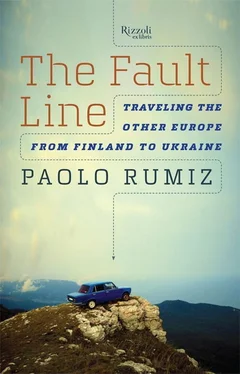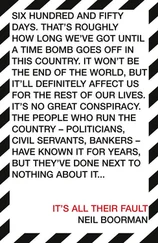There are three of us left on board. The coach goes down a long road, and at the base of a fjord that looks to be a lake lies Kirkenes, three thousand inhabitants, colored wooden houses, my end of the line and my frontier. I get off into a stiff wind impregnated with the melancholy of a Welsh coal mine, holding on to my cane, wearing all of my few clothes layered like an onion. My God, where have I come to? There’s not a living soul here. On the streets no one but fat, menacing seagulls, almost as big as eagles. The hotel is closed. I ring the bell; no answer. Rather than a hotel, it seems more like a precarious frontier barracks, a wooden building with no foundation, attached to the granite with pilings as to a muddy lake bottom. Am I in the right place? A portly taxi driver in his Russian mafia–style tinted-glass black Mercedes comes to my aid. He spits out monosyllables without vowels, opens his door, jumps out, strides up the steps of the ghost hotel, and without a moment’s hesitation, pulls out the keys from a box next to the front door. He opens it, shows me in, and grumbling, drives off.
I am totally alone, inside and outside the hotel. At eight o’clock in the evening, the social life of the town is over. Public offices and stores are open until three; all that’s left is an exasperating wait for a night that never comes. In the lobby, the reception desk is bolted shut, as though the owners had emigrated years ago.
The only sign of welcome is a slip of paper with my name and room number written on it. I realize that I’ve been left, on trust, to look after myself, and I go to install myself in a monastic cell at the end of the hallway. The door is open and the curtainless window looks out on the birch trees. At my latitude, the light would be that of five in the afternoon, but here it’s dinnertime. To the north, at the far end of the fjord, a cold sun moves horizontally behind a veil of humidity.
I’m hungry; I go to look for something to eat. I limp my way to the only tavern still open, and there too I’m perfectly alone. It’s a place right out of the English suburbs, but with something even more desperate about it, and when the young man behind the counter greets me with a brusque “What do you want?” as if to say, Why the fuck have you come al the way here, to the end of the world? I’m overcome with a desire to douse my empty stomach with a shot of vodka. Sitting there at my solitary table, I gulp down meat, potatoes, and beer, then I walk out to look at the water and discover with a throb in my heart that the last light of day is sucking me into a far-off void through a slit of pale yellow between the clouds and the tundra. The North. At two o’clock, I don’t fall asleep—sleep is not the right word. I slide my wool cap over my nose and collapse into a tempest of dreams that tosses me about until morning.
The next day, the sensation that I’ve come unstuck in time gets stronger instead of weaker. What time is it? Ten o’clock? Six? Three in the morning? My watch says it’s eight o’clock, but in the hotel there’s nary a sound to be heard. Maybe I’m the only guest. I don’t hear any noises of plates and silverware coming from the breakfast room right next to mine. But when I walk out into the hall, I see a dozen Norwegians sipping coffee in a cloisterlike silence, as though they were in the refectory of some monastery just before vespers. It takes all of my attention for my ears to intuit the hushed exchanges worthy of a confessional. So at that moment, just to break that soul-chilling ice and throw them into dismay, I call out a lusty buongiorno to everybody, and I enjoy the sight of those startled eyes lifting themselves with difficulty from their plates of fish, eggs, and onion, to respond to the new arrival with a nod. Only then do I find the strength to confront my black bread, herring, and coffee.
I have a whole day in front of me, and I pass in review the contents of my bag.
I’m about to go into the belly of the Soviet bear with the lightest bag of my entire life. Fifteen pounds. There’s an ultralight sleeping bag, four pounds of clothing, a dozen or so notebooks, stationery, medicine, a bedside book (Isaac Babel’s Odessa Tales ), ten maps, a pillowcase, some nuts, and an emergency canteen. The reduced baggage brings with it nightly laundry, synthetic fabrics that dry in two hours, layers of light clothing in cold weather, even miniaturized handwriting—something fairly close to stenography—in order to save paper, and a categorical refusal of souvenirs or purchases of less than vital necessity. Passport, visa, money, telephone—all are tucked away in a multipocket vest whose only defect is that it makes me look like a journalist. I learned long ago that traveling light instills calm, frees you from the superfluous, and allows for short-notice departures.
Back in November 2001, on the Khyber Pass, near the border between Pakistan and Afghanistan, if I hadn’t given up my suitcase for a small bag purchased at the bazaar in Peshawar, I wouldn’t have been able to jump onto the truck full of mujahideen heading for Jalalabad on the road to Kabul. There were about thirty of those trucks, and I had seen them coming a long way off, in a dust-raising convoy down the switchback turns, with their cargo beds full of men armed with whatever weapons they could find. In their thick beards and colored turbans, they were as euphoric as kids on a school trip at the idea of beating up on the Taliban. I had to decide on the spot, and when the line of trucks slowed down a few hundred yards from the border, I asked the Pashtun militiamen to let me get aboard. They laughed and said yes, so I jumped up into the back of the truck without giving any weight to a thousand utterly reasonable forebodings of an ambush. In five minutes, I was over the border with no checking of my documents.
The year 2001 was also the beginning of a great experience: the first of the journeys, which, ever since then, I’ve had the good fortune to make every summer on behalf of the newspaper La Repubblica . In that memorable summer, just two months before the eleventh of September that would change so many things, I went from Italy to Turkey through the Balkans by bicycle. In those lands, only recently escaped from the storm of ethnic conflict, I began my progressive renunciation of the superfluous. The first step came in the green campgrounds of Vojvodina, north of Belgrade. My two traveling companions, more expert cyclists than I, having noticed that I was wearing briefs under my elastic deerskin cycling shorts, made fun of me until I couldn’t take it anymore—so much so that in a cornfield between the Danube and the Tibiscus, I took off my briefs and threw them into the Serbian sky as if they were a white dove carrying good news. The picture of that liberating gesture was to remain for me a symbol of my entrance into a new way of living: more nomadic, more free-spirited, lighter.
And now here I am, beyond the Arctic Circle, checking yet again to make sure that there’s nothing necessary missing from my bag and nothing unnecessary in it. At the foot of my bed is my only pair of shoes, the survivor of a severe selection process. A week before my departure, I had selected six pairs, all thoroughly checked, and I had tried each pair for an entire day so as to avoid surprises. With a broken foot on the mend, I couldn’t allow myself the luxury of a mistake, and in the end I opted for a low-cut shoe, light as a slipper, in which I inserted a pair of interchangeable made-to-measure orthotic insoles. “ Geld, Karten, und Papiere, ” an old Triestian named Fritz once told me, to remind me that three things are indispensable for a good departure: money, maps, and documents. I can now add Schuhe , shoes. A man with a good pair of shoes can respond to any kind of emergency. He acquires a better stride, becomes less clumsy, inspires more confidence. His erect position helps him think better, gives him a more rounded calligraphy, a more pleasing metric cadence. A good pair of shoes counts more than a pile of good books. And I must confess, I write with my feet.
Читать дальше












